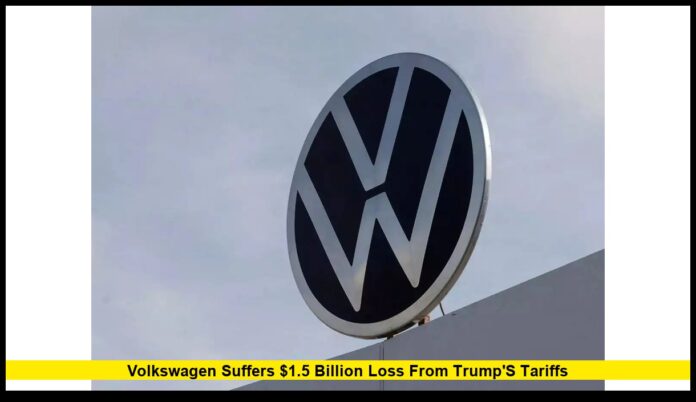Breaking News: Europe’s largest automaker faces unprecedented financial blow as U.S. import duties devastate profitability in first half of 2025.
Massive $1.5 Billion Hit Rocks Volkswagen’s Financial Performance
Volkswagen reported a 1.3-billion-euro (US$1.5-billion) first-half hit from tariffs and cut its full-year sales and profit margin forecasts in the German carmaker’s first assessment of the damage from U.S. President Donald Trump’s trade war. The German automotive powerhouse announced these devastating figures on Friday, July 25, 2025, marking one of the most significant corporate casualties of the ongoing U.S.-Europe trade conflict.
The impact has been swift and severe. Sales in North America plunged 16% due primarily to U.S. tariffs, said Volkswagen, which owns a host of brands including Audi, Lamborghini and other luxury marques. This dramatic decline represents a seismic shift for the company’s North American operations, traditionally a crucial profit center.
Trump’s 27.5% Tariff Rate Creates Perfect Storm for German Automaker
Volkswagen currently faces total US tariffs of 27.5%, the company said, combining the recent 25% auto tariff on top of preexisting 2.5% tariffs. This punishing rate structure has fundamentally altered the economics of importing vehicles from Volkswagen’s European manufacturing facilities to American consumers.
The tariff burden extends far beyond simple cost increases. Industry analysts warn that such high rates could permanently reshape global automotive supply chains, forcing manufacturers to reconsider decades-old production strategies. For Volkswagen, which has invested billions in European manufacturing excellence, the tariffs represent an existential challenge to their traditional business model.
Company Slashes 2025 Financial Guidance Amid Mounting Pressure
The financial carnage has forced Volkswagen’s leadership to take drastic action on their annual projections. Europe’s biggest carmaker now expects an operating return on sales in the range of 4-5%, compared with a previously forecast 5.5-6.5% range, the company said, giving its long awaited assessment of the impact of tariffs on its business.
This guidance cut represents more than just numbers on a balance sheet. It signals to investors, employees, and industry partners that Volkswagen anticipates prolonged economic headwinds from the trade war. The reduction from their optimistic early-year projections to current reality demonstrates how quickly geopolitical tensions can devastate corporate performance.
tariffs alone cost the company 1.3 billion euros in the first six months of the year. Restructuring provisions, meanwhile, amounted to 700 million euros over the same period. These dual pressures of external tariffs and internal restructuring costs create a challenging environment for maintaining profitability.
Global Sales Performance Shows Mixed Results Despite U.S. Struggles
While North American sales collapsed, Volkswagen managed to find growth in other international markets. Volkswagen reported first-half vehicle sales growth of 19% in South America, 2% in Western Europe and 5% in Central and Eastern Europe. The company said this more than made up for the expected declines of 3% in China and — primarily due to tariffs — for a 16% dip in North America.
This geographic diversification has provided some buffer against the U.S. tariff impact, but it cannot fully offset the substantial losses from what was previously a highly profitable market. The company’s ability to grow in emerging markets like South America demonstrates operational resilience, even as established markets face political and economic turbulence.
Industry-Wide Implications of Escalating Trade War
Volkswagen’s struggles reflect broader challenges facing the global automotive industry amid rising protectionism. The German automaker’s experience serves as a cautionary tale for other European manufacturers who rely heavily on U.S. market access for profitability.
The $1.5 billion loss represents more than just corporate financial pain—it signals potential job losses, reduced investment in research and development, and delayed innovation in critical areas like electric vehicle technology. When major automakers face such severe financial pressure, the ripple effects extend throughout their extensive supplier networks and local communities.
Strategic Response and Future Outlook
Volkswagen on Friday gave its first assessment of how US President Donald Trump’s trade war with Europe is expected to impact its 2025 earnings after tariffs dealt a blow to the German auto giant’s operating profit in the second quarter. This transparency provides markets with crucial insight into the magnitude of trade war impacts on major corporations.
Company executives now face difficult decisions about production location, pricing strategies, and market prioritization. The traditional model of manufacturing in low-cost countries for export to high-value markets faces fundamental challenges when trade barriers reach current levels.
Market Reactions and Investor Sentiment
The financial markets have responded with concern to Volkswagen’s announcement. Investors recognize that if Europe’s largest automaker struggles with these tariff levels, smaller competitors may face even more severe challenges. The guidance cuts announced Friday represent a sobering reality check for an industry already grappling with electric vehicle transitions and supply chain disruptions.
Looking Ahead: Navigating Uncertain Trade Environment
As 2025 progresses, Volkswagen’s experience will likely influence other multinational corporations’ strategic planning. The $1.5 billion loss demonstrates how quickly trade policies can transform from political rhetoric into concrete business impacts affecting thousands of jobs and billions in investment.
The automotive industry’s future depends heavily on resolving these trade tensions. Until then, companies like Volkswagen must balance short-term survival with long-term strategic positioning in an increasingly fragmented global economy.
